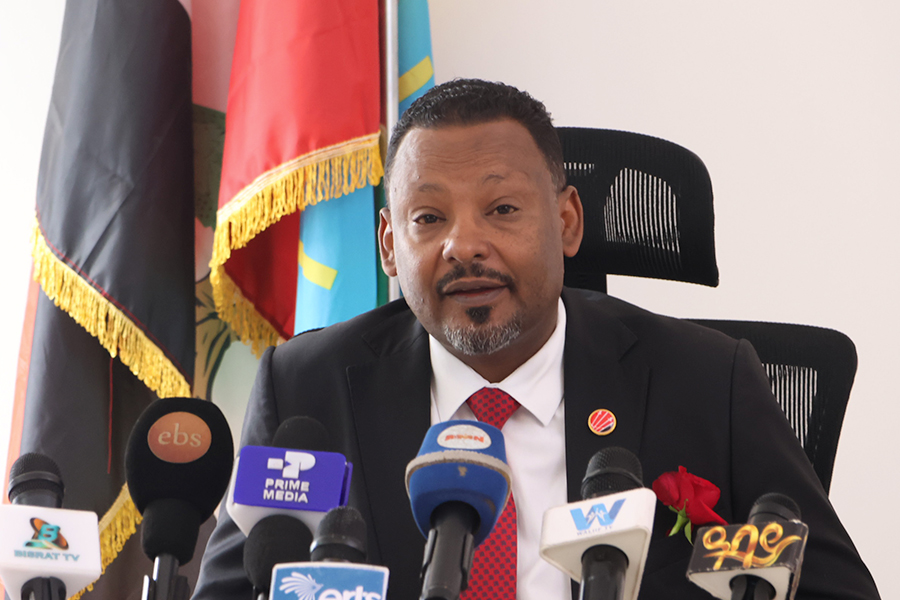
May 11 , 2019
By TEMESGEN MULUGETA ( FORTUNE STAFF WRITER )
The Ministry of Finance established a 12-member public finance management advisory council that will facilitate government finance administration.
The Council includes two members from Addis Abeba University, five experts from the private finance sector, one NGO representative, a central bank official and two civil servants from the Ministry, to which it will be accountable.
Established two months ago and chaired by Eyob Tekalign (PhD), state minister for Finance, the Council has three working groups: accounting and reporting International Financial Reporting Standards (IFRS); internal audits; and modernisation of the finance sector.
This comes as the country’s external debt climbed to almost a third of the gross domestic product (GDP) in the past fiscal year, compared to 18pc six years ago. With public and private debt standing at 61pc of GDP, the International Monetary Fund stresses that while liquidity risks are elevated, the public debt remains unsustainable.
In the first half of the current fiscal year, disbursement from multilateral institutions stood at 40.6 billion Br, more than double the amount in the previous fiscal year; and 17 billion Br was disbursed by bilateral partners, a 42pc drop from the same period a year ago.
Close to half of the disbursements were in the form of concessional loans that bear low-interest rates and long repayment periods.
It also comes at a time when the Ministry of Finance is undertaking reforms to address gaps in domestic revenue mobilisation. This includes a tax reform plan to revise excise taxes to generate 20 billion Br to 30 billion Br more a year, as well as the development of an electronic procurement system to make procurement more efficient and transparent.
The Ministry is exercising a more prudent fiscal policy following a rise in debt, disappointing government revenue and escalating inflation. Last fiscal year’s federal budget stood at 346.9 billion Br, five percent lower than that of the previous year in dollar terms.
An expert in the field, Eyob Tesfaye (PhD), believes that the establishment of the advisory council will make a positive change on the macroeconomy and will build accountability.
Besides minimising the expenditure of the government, it will improve budget quality and help bring economic growth to the country, according to the expert, a veteran macroeconomist currently serving as a member of the Commercial Bank of Ethiopia's board.
“The old habits of the finance sector will be the main challenge during the implementation period, but the establishment of the council shows the attention the sector is getting,” he said.
PUBLISHED ON
May 11,2019 [ VOL
20 , NO
993]

Radar | Jul 21,2024

Editorial | Nov 02,2024

Sunday with Eden | Jan 07,2023

View From Arada | Aug 12,2023

View From Arada | Feb 20,2021

Viewpoints | Jan 09,2021

Fortune News | Jul 13,2025

Fortune News | Aug 02,2025

Radar | Aug 31,2019

Radar | May 23,2021

Dec 22 , 2024 . By TIZITA SHEWAFERAW
Charged with transforming colossal state-owned enterprises into modern and competitiv...

Aug 18 , 2024 . By AKSAH ITALO
Although predictable Yonas Zerihun's job in the ride-hailing service is not immune to...

Jul 28 , 2024 . By TIZITA SHEWAFERAW
Unhabitual, perhaps too many, Samuel Gebreyohannes, 38, used to occasionally enjoy a couple of beers at breakfast. However, he recently swit...

Jul 13 , 2024 . By AKSAH ITALO
Investors who rely on tractors, trucks, and field vehicles for commuting, transporting commodities, and f...

Oct 18 , 2025
The political establishment, notably the ruling party and its top brass, has become p...

Oct 11 , 2025
Ladislas Farago, a roving Associated Press (AP) correspondent, arrived in Ethiopia in...

Oct 4 , 2025
Eyob Tekalegn (PhD) had been in the Governor's chair for only weeks when, on Septembe...

Sep 27 , 2025
Four years into an experiment with “shock therapy” in education, the national moo...